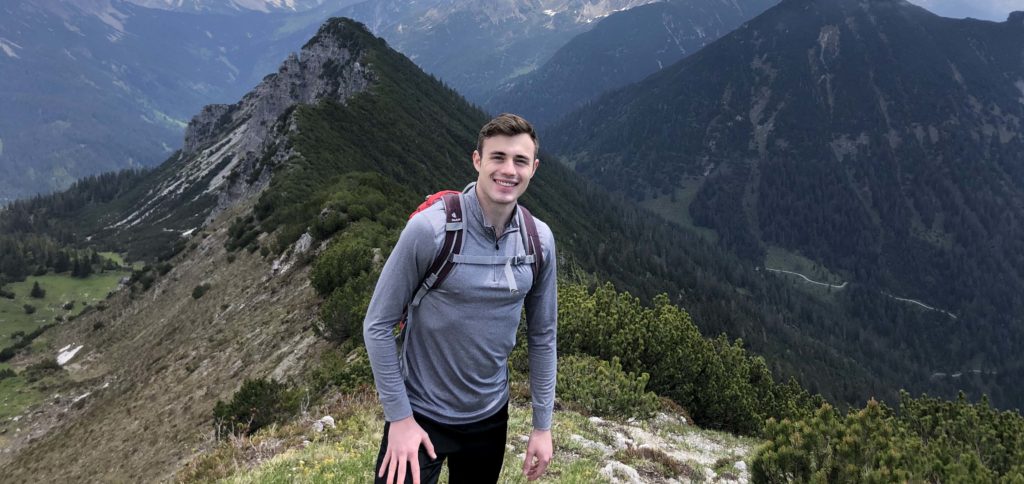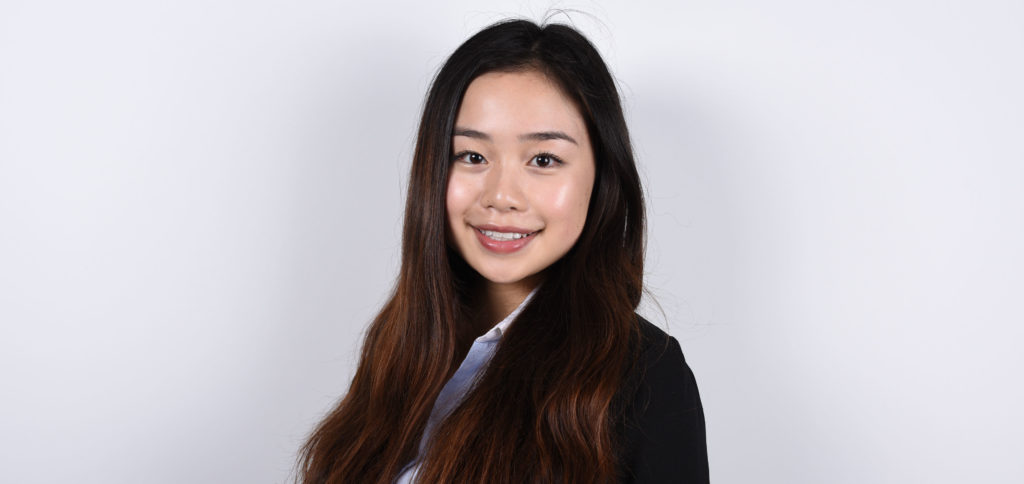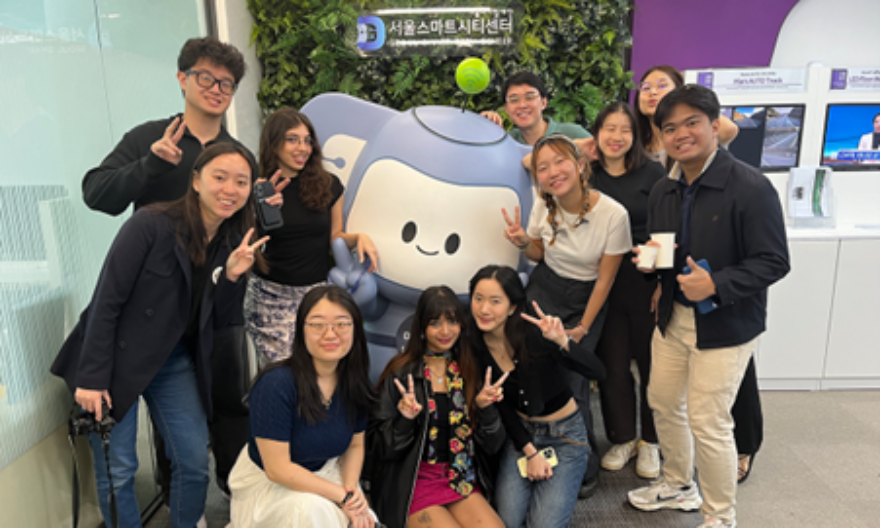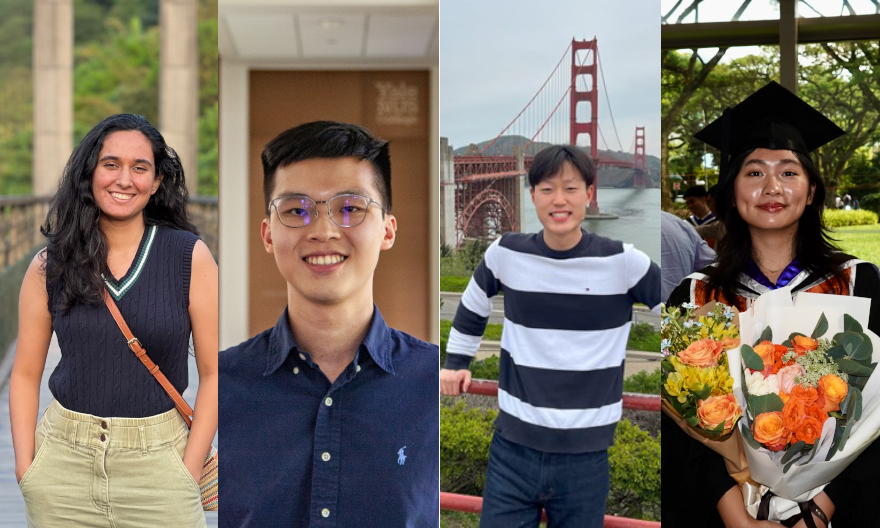Yale-NUS students head to postgraduate studies in science and business
As the Academic Year 2020/2021 comes to an end, several Yale-NUS College students from the Class of 2021 have decided to further their education in the graduate schools all over the world. Maximilian Heidegger, Gideon Lee and Lavonna Mark are among some who are excited to pursue specialisations in their fields of interests.
 Maximilian Heidegger (Class of 2021) will be pursuing a Master in Management at INSEAD. Image provided by Maximilian.
Maximilian Heidegger (Class of 2021) will be pursuing a Master in Management at INSEAD. Image provided by Maximilian.
Philosophy, Politics and Economics (PPE) major Maximilian Heidegger has opted to join the Master in Management programme at INSEAD. The programme, at one of the world’s largest and leading graduate business schools, will see him studying in its Europe campus in Fontainebleau, France, for six months before returning to its Singapore campus next year. Upon graduation, Maximillian will be joining multinational conglomerate Jardine Matheson in Hong Kong as an executive trainee.
Maximilian credits his time at Yale-NUS College for “preparing [him] for graduate school in every aspect that [he] can imagine”. In particular, he notes a few key areas where a Yale-NUS education helped him shine in his applications for graduate school.
“First, internationally oriented business schools like INSEAD look for candidates who can thrive in multicultural and diverse academic and professional environments. Yale-NUS is one of the only colleges in the world that is able to offer such an experience early at the undergraduate level. Second, business school curricula generally focus heavily on seminar and discussion-based classes. Yale-NUS’ pedagogical model is very similar, and I believe that this familiarity with seminar-style courses will enable me to quickly adapt to business school,” he shared.
 Gideon Lee (Class of 2021) will be pursuing a PhD in Molecular Engineering at the University of Chicago. Image provided by Gideon.
Gideon Lee (Class of 2021) will be pursuing a PhD in Molecular Engineering at the University of Chicago. Image provided by Gideon.
Physical Sciences major Gideon Lee was accepted into three different PhD programmes at Yale University, the University of Chicago (UChicago) and University of Maryland. He will be pursuing a PhD in Molecular Engineering at UChicago. He attributes his interest in academia to his early exposure to intensive and interesting research at Yale-NUS College.
During his first-year in College, Gideon had the opportunity to work with Associate Professor of Science (Physics) Shaffique Adam on a summer research project, which saw him “dealing with some pretty exotic effects in condensed matter systems”. As his first foray into high level research, Gideon said the experience introduced him to the excitement of working on problems at the edge of scientific understanding.
As a second-year student, Gideon took a class on quantum computation with Associate Professor of Science (Physics) Ng Hui Khoon. “It’s rare for such a class to be offered at an undergraduate level. The level of rigour in that class pushed me to be able to work on research-level problems. This was particularly helpful in the summer immediately after, which I spent at Yale doing research in quantum computation and information,” he said.
The close interactions he had with his professors at college and the chances to start research very early on in his undergraduate journey were crucial in setting him on the path for graduate school. Testament to the amount of time Gideon has invested in undergraduate scientific research, he has one paper published in PRX Quantum and another pending for publication in Physical Review B.
The first paper is titled ‘Resilience of quantum random access memory (QRAM) to generic noise’. Gideon first began research on the paper in his second year when he went on the Yale College Dean’s Summer Research Fellowship coordinated by the Yale-NUS Centre for International & Professional Experience (CIPE). The research was done under the supervision of Professor Liang Jiang (UChicago) and Professor Steve Girvin (Yale) and led by Connor Hann (Yale).
QRAM is an architecture that allows quantum computers to access a database for data processing applications. “The issue with quantum computers is that they are extremely sensitive and thus prone to suffering errors caused by environmental noise. We proved that a particular way of carrying out the operations that constitute a QRAM was particularly resilient to noise, which is a promising result for future data processing applications on quantum computers,” he explained.
 Lavonna Mark (Class of 2021) will be pursuing a Neuroscience PhD at Stanford University. Image provided by Lavonna.
Lavonna Mark (Class of 2021) will be pursuing a Neuroscience PhD at Stanford University. Image provided by Lavonna.
Life Sciences major Lavonna Mark (Class of 2021) was accepted into multiple Neuroscience PhD programmes, including from Yale University, Harvard University, Princeton University, and Stanford University. She will be attending Stanford’s Neuroscience PhD programme with support from the highly prestigious Stanford Graduate Fellowship.
“I believe there is still so much to understand about the brain from a basic science perspective, such as how its properties give rise to the mental states involved in cognition. One opportunity I look forward to in graduate school is learning more from the multiple fields that contribute to neuroscience—such as statistics, genetics, and mathematics. I aim to combine experimental and computational approaches in my own research,” she said.
Similar to Gideon, Lavonna credits the many opportunities and fellowships for undergraduate scientific research that she has received in college. “The Yale College Dean’s Research Fellowship, for instance, allowed me to pursue research in the Cardin and Higley Labs at the Yale School of Medicine. This research opportunity was life-changing, as I was able to learn from experts on how to conduct in vivo experiments while working with an applied mathematician (Dr Benisty) to develop novel data analyses.”





